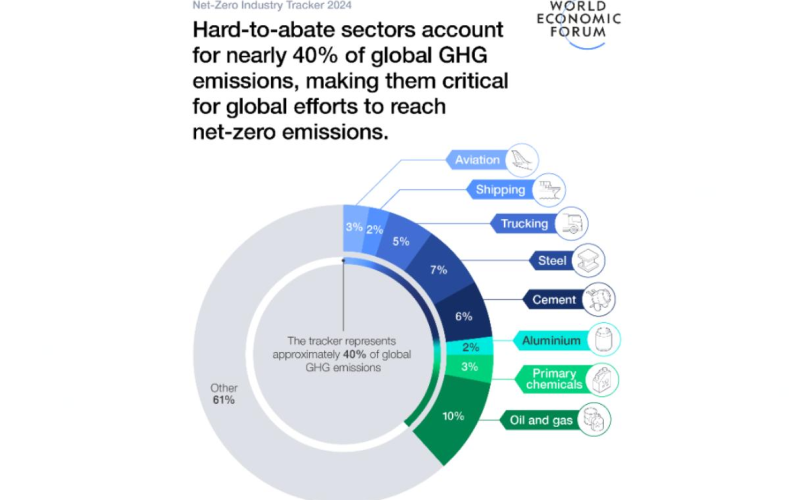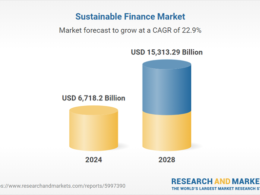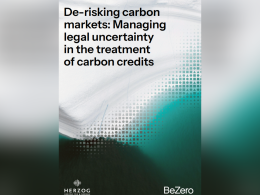The World Economic Forum’s ‘Net Zero Industry Tracker 2024’ reveals modest progress in reducing emissions across eight hard-to-abate sectors—steel, aluminum, cement, primary chemicals, oil and gas, aviation, shipping, and trucking. Together, these industries, vital to the global economy, achieved a 0.9% reduction in absolute emissions between 2022 and 2023, even as global energy-related emissions rose by 1.3% during the same period.
Despite this progress, the pace of emissions reduction falls far short of what is needed to achieve net-zero goals by 2050. The report underscores the enormity of the task ahead, estimating a need for $30 trillion in investments by mid-century. Of this, $13 trillion must come directly from these industries, while $17 trillion is required from supporting ecosystems such as energy suppliers.
Encouragingly, nearly half of the required greenhouse gas (GHG) reductions could be achieved with existing commercially viable technologies. The report notes that emissions intensity—the average emissions per unit of production—has declined by 4.1% over the past five years, reflecting the impact of current solutions. Further progress hinges on intensified cross-sector collaboration, faster deployment of clean-energy infrastructure, particularly renewable electricity, and robust policymaking to unlock the transformative potential of emerging technologies.
Produced in collaboration with Accenture, the Net Zero Industry Tracker 2024 evaluates the progress and future trajectory of these eight sectors, which collectively account for 40% of global GHG emissions. It identifies key barriers to decarbonisation and offers actionable pathways, including a readiness framework for related technologies, investment strategies, and policies.
“While there is a long way to go, it is encouraging to see that hard-to-abate sectors are making strides in emissions reductions, indicating that they are investing in the energy transition. Achieving net zero by 2050 will require unprecedented collaboration and financial innovation across sectors to raise the capital needed. However, we already possess many of the technologies and policy frameworks to act now,” said Roberto Bocca, Head of the Centre for Energy and Materials, World Economic Forum.
The report highlights that emissions reductions have been driven by improved efficiency and decarbonisation efforts rather than reduced output. Between 2019 and 2023, overall demand in the eight sectors grew by an average of 9.2%, yet total emissions and emissions intensity declined. Notably, five sectors—aluminum, cement, chemicals, aviation, and trucking—achieved reductions in emissions intensity through increased use of low-carbon power, reduced coal consumption, greater energy efficiency, and higher recycling rates.
Despite these advances, the report points to persistent challenges, including high interest rates, political uncertainties, trade restrictions, and the limited availability of clean-energy technologies. Significant investments are also needed to develop infrastructure for low-carbon power, hydrogen, and carbon capture, utilisation, and storage (CCUS). While progress in low-carbon power infrastructure is promising, hydrogen and CCUS infrastructure currently meet less than 1% of sector requirements.
For the first time, the report highlights the potential of generative AI to accelerate decarbonisation in hard-to-abate sectors. By enhancing productivity, streamlining operations, and optimising energy use, generative AI could improve capital efficiency by 5–7%, potentially reducing net-zero investment needs by up to $2 trillion. Beyond cost savings, AI offers solutions for asset management, R&D acceleration, and product-level carbon reporting. However, increased adoption of AI could significantly raise electricity demand, potentially straining low-carbon energy resources.
“Heavy industries hold the key to global decarbonisation goals, with AI demonstrating real potential in helping meet the challenge of net zero. Leaders who harness the productivity potential and economic value of generative AI will be on a reinvention-ready path—one that helps avoid expanding emissions and makes good on the promise of AI as a critical lever for decarbonisation,” said Muqsit Ashraf, Group Chief Executive for Accenture Strategy.
Espen Mehlum, Head of Energy Transition Intelligence, World Economic Forum added, “A system approach is needed to simultaneously solve several challenges associated with scaling up clean-energy technologies and infrastructure important in the hard-to-abate sectors. Policymakers can accelerate developments by creating incentives aligned with the goals of the hard-to-abate sectors, energy suppliers and consumers to benefit everyone involved.”

















